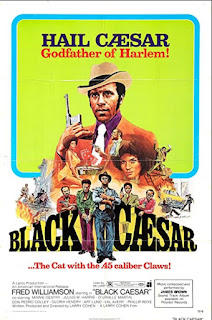Black Caesar (1973)
Although he had already starred in a couple of early low-budget blaxploitation films, Fred Williamson had his big break in Black Caesar. It was also Larry Cohen's second feature film. Cohen had extensive experience in writing and directing for television prior to his debut film, Bone. Williamson, meanwhile, had been a professional football star before turning to acting, also getting his start on television. The combination of the two, and the fact that Cohen had a script ready to take advantage of popular films like Shaft and Super Fly helped give both the career kick they needed.
The roots of Tommy Gibbs's (Williamson) empire begin as a young man (Omer Jeffrey) in Harlem in 1953. After successfully assisting in a hit, he is given a job as a bag-runner, only to run afoul of a racist beat cop named McKinney (Art Lund) who is on the mob's payroll. Sent away for a number of years, he encourages his best friend Joe (Philip Roye) to get an education so that he can help him when he gets out.
In 1965 Gibbs, with the help of Joe and their preacher friend Rufus (D'Urville Martin), is an up-and-coming force on the streets of Harlem. After committing a hit himself he talks local enforcer Cardoza (Val Avery) into putting him on his payroll, excepting a seemingly worthless part of Harlem as territory in exchange. Soon he is able to leverage his power with the help of a lawyer named Coleman (William Wellman Jr.) and get ahold of business ledgers that allow him to have power over McKinney, who is now in line for Commissioner. Initially hoping to do some good for his community as well as for himself, Gibbs eventually becomes as bad as his enemies, alienating his girlfriend Helen (Gloria Hendry) and leaving himself open to betrayal by McKinney and Coleman.
Black Caesar has similarities to the 1931 film Little Caesar, which starred Edward G. Robinson as a small-time crook who makes it big and Douglas Fairbanks as his partner. It also bears some resemblance to the original 1932 Scarface starring Paul Muni, in which it presents the main character's rise and fall as a crime boss. The script itself was originally written for Sammy Davis Jr., who was looking around for a movie that he could do and separate himself from the rest of the Rat Pack, and the early 1970s explosion of blaxploitation films seemed to be a good fit. Unfortunately, Davis's I.R.S. troubles led to the script being purchased by American International Pictures, which was the perfect home for a movie of this type.
The strange situation was having someone like Cohen, who at the time had dabbled in horror and had largely written for crime dramas and westerns, to be heading a film with a black protagonist. Both Cohen and Williamson had known each other socially for a while, and with Davis out he was a good choice, as his on-screen charisma and physique made him perfect for such roles. He also made sure that he adjusted the script as needed so that it was more attuned to the black experience than it had been originally. That combination, as well as strong supporting roles from Hendry, Martin and Roye, and a solid villain played by Art Lund, elevated this above a number of other films that followed the initial films in the genre.
This was no mean feat because, although this was Cohen's second feature and many of the hallmarks of his guerilla filming style and fast-paced camera work is there, Black Caesar is still quite rough around the edges. Due to the short filming schedule and low budget there are a number of harsh edits, sound errors and stunts that almost went wrong but were left in the film. Hendry at times is over-the-top melodramatic and, in a jarring turn, there is a rape scene involving Tommy after building him up to be an anti-hero. Although it is probably meant to signal the beginning of his decline, it comes out of nowhere and just seems gratuitous. Early scenes are given dates, but after the events begin in 1965 it is hard to really tell where on the timeline things are happening, particularly since Cohen didn't have the funding to dress up the set to make it look like it wasn't 1973.
Despite all this the performances shine through and, while the story could be a bit more coherent, Cohen and Williamson makes us cheer for Tommy Gibbs when we should and feel both pity and anger when he lets everyone down. There is a sequel to this called Hell Up in Harlem, and the theatrical prints of Black Caesar removed Cohen's original ending once American International decided they wanted to do a sequel, but happily the version in print these days show his original vision, which is inevitable to these types of films, especially since this was inspired more by gangster films of the 1930s than more epic mob stories like The Godfather.
Black Caesar (1973)
Time: 87 minutes
Starring: Fred Williamson, Philip Roye, D'Urville Martin, Gloria Hendry, Art Lund
Director: Larry Cohen




Comments
Post a Comment